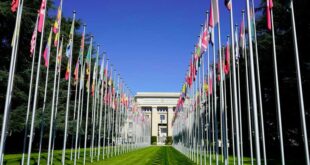Ahmad Abbas
Weeks after the announcement of the Aukus Alliance, which aims to confront China in the Asia- Pacific region, the United States launched a summit for democracy, aimed at uniting the countries of the region and building more military alliances, which must be based on an ideological cover that gives them legitimacy.
Why does the United States resort to democracy in its next war?
First of all, one of the historical reasons for the success of any military alliance is the extent to which the member states are interconnected, and the lack of a common ideology usually causes the efforts of any military alliance to fail. The survival of NATO, for example, was and still is thanks to the common liberal ideology on confronting the Soviet Union, and the existence of a bipolar world with no impressive gray places.
There is an ongoing debate about whether the Soviet union cooperation with Great Britain and the US before World War II was an effective traditional alliance. International security specialists argue that it was not an alliance because coordination between them was weak, due to the fact that the allied countries did not meet around the same values, so the first step to build sustainable military alliances lies in creating a value or an ideology that requires the formation of that alliance and gives it a justification for existence.
Recently, in the light of multipolarity in the world, the United States began to lose the capacity of building military alliances and legitimacy to deliver nuclear submarines to Australia according to non – proliferation agreement, and on the other hand the change in the concept of alliances in most countries of the world from the traditional military perspective to the perspective of strategic partnerships, which includes the absence of a military commitment to the allied countries, the United States felt The danger of this pluralism and the shift in the concept of alliance, because Asian countries will not find themselves forced to enter any military alliances against China.
Second, in recent years, China has been able to restore relations with many countries in Southeast Asia. Thanks to economic interdependence and the Belt and Road Initiative, military conflicts in the region have begun to subside, For example, relations between China and Vietnam have become calmer in recent periods. One of the stated goals of Belt and Road Initiative is achieving balance of power in the region and economic integration with Asian countries, thence achieving stability and development in these turbulent regions, which may lead gradually to an increase in China’s power, and the United States losing its control over that region over time, and therefore prompts the US to resume the war of values Once again to impose control on these countries and find justifications for isolating China and destroying its economic ambitions in the region.
If we look at the volume of trade exchange between China and ASEAN, it rose from less than $300 billion in 2010 to 641.5 in 2019, and to 731.9$billion in 2020, thus ASEAN became the largest and most important partner for China, followed by the European Union.
In view of the free trade agreements that China has succeeded in concluding, in 2020, Cambodia signed the first bilateral free trade agreement with China, which prompts the two countries for comprehensive strategic cooperation aimed at increasing the volume of trade to 10 billion dollars in 2023.
Not only Cambodia, China’s FTA partners are ASEAN, Singapore, Pakistan, New Zealand, Chile, Peru, Costa Rica, Iceland, Switzerland, Maldives, Mauritius, Georgia, Korea, Australia, Hong Kong, and Macao. China is also seeking to conclude 8 additional free trade agreements in the coming periods.
According to the liberal theory of international relations, the high volume of trade and economic interdependence between countries causes more stability and makes the possibility of conflicts less, as the high costs of war and the loss of economic privileges reduce the chances of conflict, and therefore these growing partnerships between China and the Asia- Pacific countries threaten American alliance with these countries, For example, Japan, Vietnam and South Korea are among China’s largest trading partners, and therefore the likelihood of them being used as allies by the United States to isolate China has become weak, especially with China’s tendency to integrate with the countries of the region and request formal accession to the Comprehensive and Progressive Agreement for Trans -Pacific Partnership.
All this is forcing the United States to borrow the slogans of democracy once again to become the value on which more alliances are built in the Pacific region to isolate China and undermine its efforts to build a new international order.
Third, the United States began to notice democratic threats in the countries of South and East Asia, particularly Myanmar, Thailand, the Philippines and Malaysia.
In Myanmar, the military coup last February undermined the dream of democratization and the desire of the United States to include the state as an ally that could control many Chinese interests there, especially the gas pipelines.
Additionally in the Philippines and Malaysia, there are many problems with the rise of new right-wing currents, such as the Malay-Islamic coalition came to power in Malaysia.
Such developments gradually lead to the disappearance of democracy in Asian countries in favor of the Chinese regime, which may cause the United States to be unable to establish any alliances in the future.
As a result of all these reasons combined, the United States has revived the slogans of democracy and re-marketed them again through the summit of democracy that it calls for, in order to provide a legitimate cover for more military alliances aimed at confronting China, such as the Aukus.
Democracy to provoke the war
One of the controversial issues at Biden’s Democratic Summit is to invite Taiwan among 110 other countries, which may revive the issue of recognizing Taiwan and put the “one China” principle in jeopardy.
Taiwan’s invitation to participate in the democracy summit has no other meaning than to ignite conflicts in the region and try to isolate China by considering it against the international liberal order.
The US Assistant Secretary of Defense for Security Affairs in the Asia-Pacific region Eli Ratner has not stopped declaring in recent times that strengthening Taiwan’s self-defense is an “urgent mission” and a key feature to deter China, at a time when the United States is seeking new alliances, so, are there other dimensions For the summit of democracy? Will there be new US moves? Especially because the reunification of Taiwan is one of the priorities of the Chinese Communist Party, which was proclaimed by President Xi Jinping, while Speaking in the Great Hall of the People to commemorate the 110th anniversary of the revolution in September.
The attempt of the United States to create conditions similar to those of the Cold War may not be successful this time, for the Cold War was a clear struggle between two poles with conflicting ideologies, while the international system now with its multipolarity is no longer suitable for creating a war of values around which countries gather. The concept of traditional alliance has now changed and replaced by alignment which ignores military cooperation, so a lot of countries have become Less desire to enter alliances that may result in economic losses.
In light of China’s current economic diplomacy and development initiatives that include dozens of countries, especially with the principle of political non-interference pursued by China, countries no longer want to lose these benefits in favor of some values that have proven their inability to address countries’ problems yet.
The Shifting Paradigm of alliances in international relations, and the emergence of an alternative to the liberal model, based on economic aspects alone, threatens the position of the United States in the international system, which is pushing the United States to invoke the conflict of values and play the role of guard in the Asia-pacific region, the coming days will reveal the repercussions of the summit And if the United States can build new traditional alliances, that will be able to contain the rise of China
 Geostrategic Media Political Commentary, Analysis, Security, Defense
Geostrategic Media Political Commentary, Analysis, Security, Defense





